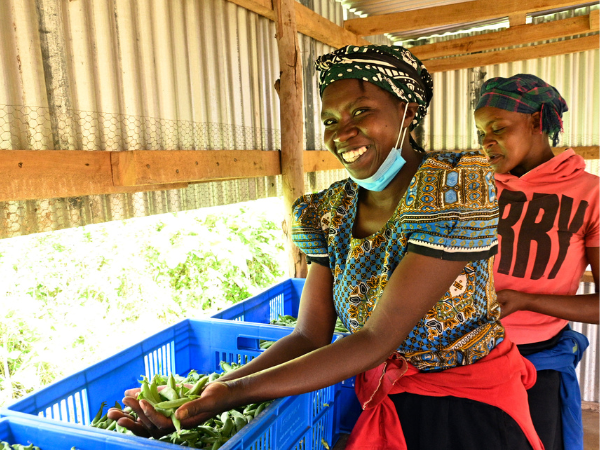INTRODUCTION
International Day of Rural Women 2022 takes place on October 15th under the theme: ‘Rural Women Cultivating Good Food For All’ – it celebrates the women who are the backbone of agriculture in Africa and beyond. For real climate action, we must empower them.
The global climate emergency is affecting every country in the world. And it’s the most marginalised who are the hardest hit.
Right now, irregular weather is having a catastrophic impact on lives around the world. We are witnessing these changes here in Uganda.
To the north, families in the Horn of Africa are struggling to cope with the worst drought in 40 years. It is claiming the life of one person every 48 seconds to hunger. But climate change isn’t only rising temperatures and drought. As I write this, nearly 1,500 people have died in floods in Pakistan.
For 50 years, Self Help Africa has been supporting smallholder farmers to grow more food and earn an income. Many subsistence farmers are already farming small plots on marginal land, with limited resources. An increasingly challenging climate means that earning a living from the land is more difficult than ever.
Supporting smallholder farmers to adapt to, and mitigate the effects of, global warming, is at the heart of our work. Self Help Africa recognises that our approaches must empower women, for our programmes to be effective.
Many women farmers are not reaching their full potential. Women are the most affected by poverty, climate change, food insecurity and poor access to healthcare.
Women farmers in Africa could produce up to 30 per cent more food if they were granted equal access to land, advisory support, tools and technology. That’s enough to lift 150 million people out of hunger. Nonetheless, gender stereotypes and women’s work burden limit their opportunities to learn about, participate in, and benefit from, ‘climate-smart’ farming methods.
Improving both men and women’s access to climate information is crucial for poor communities that need to transition to ‘smart’ farming methods for survival. That’s why in Uganda, Self Help Africa is integrating training in climate-smart farming methods, such as ‘ecological land use management’, into some of our existing livelihood projects for women, as well as for young people and refugee communities.
CREATING ONE-STOP TRAINING CENTRES
Self Help Africa have established centres in Northern and Eastern Uganda that have become one-stop training and innovation centres for smallholder farmers in climate-smart farming techniques. These farmers are predominantly women, refugees, younger people, or those with disabilities.
At these centres, Self Help Africa Uganda is training participants about, and improving their access to, climate-resilient farming technologies. This allows farmers to start growing high-value vegetables year-round, despite the increasing climate threats. Our aim here is to contribute to the sustained ability of smallholder households to withstand, adapt to, and recover from any adversity.
Self Help Africa Uganda’s training centres are established on land owned by these participating smallholder farmers. This land is divided into clearly marked demonstration blocks and plots for different enterprises and crops. The approach is pivotal towards creating sustainable livelihoods for families with better income, food, and nutrition security.
Training farmers is based on a model known as ‘Climate Resilient Agro-Ecosystems Model’ (known as CRAEM). The model aims to improve the livelihoods of smallholder farmers while empowering them to contribute to climate change mitigation and sustainably increase agricultural production and productivity. This model of ‘smart’ farming encourages farmers to practise sequential crop planting while optimising land use through simple techniques like sack moulds, keyhole and mandala gardening (v-shape). The farmers learn about modern kitchen gardening, planting in rows with the aim of increasing year-round food production, boosting food and income options. They can also access the centre’s systems and technologies to kickstart their new growing approaches. When they’re ready, participants transfer their new-found knowledge and skills to their homes and land.
A COMMUNITY-LED APPROACH TO GENDER EMPOWERMENT
Raising community awareness about the importance of women accessing resources, power and leadership is also essential to secure long-term positive change. Strengthening the role of women in agriculture is essential if we are to achieve sustainable farming during these turbulent times
At Self Help Africa, we take a community-led approach and focus on examples of positive change that may already be occurring within a household or community. This often increases both women and men’s interest in what else could change for the better, prompting greater awareness and discussion between those who participate. The aim is to empower them with the skills to reflect on their personal situation and come up with concrete solutions to any constraints and challenges they may be experiencing.
TRANSFORMING ONE FAMILY’S FORTUNES
Alice Arengo’s family, who accessed our centre in Eastern Uganda, is one example. Single mother-of-two, Alice Arengo and her eight siblings are now using improved seeds. With a solar irrigation system, the family are growing and selling crops, including tomatoes, soya beans and cassava.
When Alice’s mum died in February this year, as the eldest daughter she assumed responsibility for her siblings. Alice has no education to fall back on. So the 32 year old hopes her new-found knowledge will diversify and boost her family’s food production, helping increase their household income.
Inspired by Self Help Africa’s gender transformation learning process, the whole family now plays an active role in their agri-business. Alice’s older brothers plough the garden with the help of an ox plough provided to the family before planting the seedlings. The other younger children help weed and harvest, while Alice takes the vegetables to market with her father’s help. The good news is that empowering girls and women yields undeniable returns. When women work, they invest 90 percent of their income back into their families. This is compared with 35 percent for men, according to the Clinton Global Initiative. Investments in women like Alice are investments in their whole community.
With Self Help Africa’s support, climate-smart farming methods are enabling families like Alice’s to build resilience and hope for a better future.

